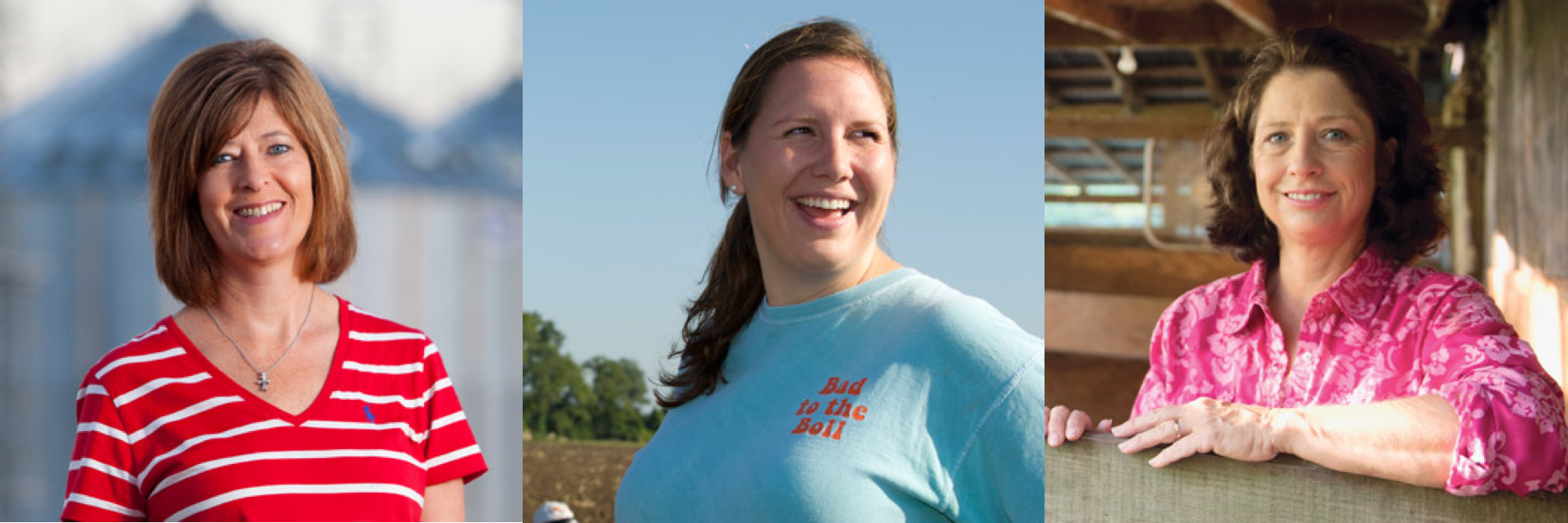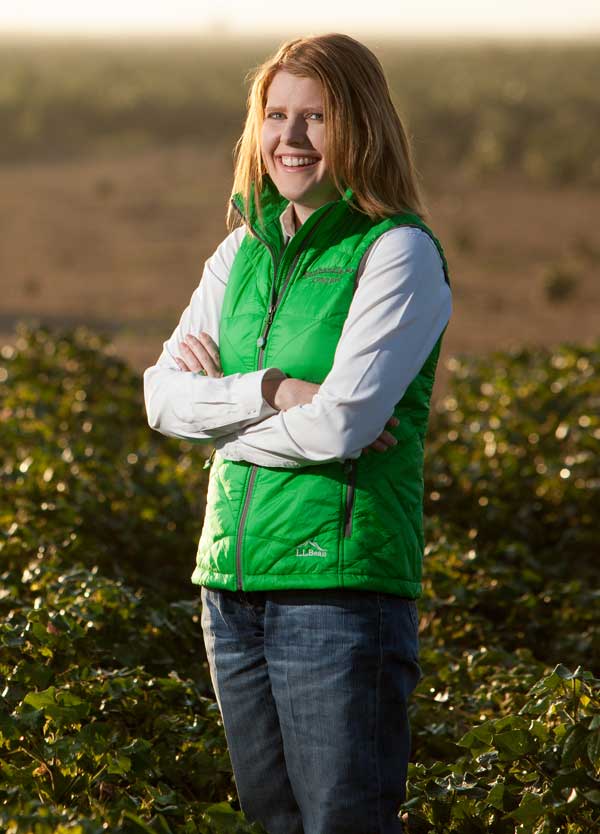
Photos by Russell Graves and John Ballance
Joyce Skarke, Catherine LaCour, Dana Fairchild
Like many young people, Catherine LaCour graduated from university uncertain about her career path. With a bachelor’s degree in communication disorders, she hadn’t honed in on a career — until, that is, a counselor suggested that her enthusiastic and optimistic personality might mesh well with farming.
One of four siblings who left the large family farm near Morganza, La., Catherine had previously never considered a career in agriculture. Fortunately, she didn’t have to look far to find farm work. Her father and aunt gladly made a place for her in the family operation, and in 2011, she started work in the farm office.
“Dad loves it that I’m here,” she says.
Learning the business side of agriculture and meeting other women farmers proved more challenging, however.
Thus, when her dad, Louisiana Land Bank customer George LaCour, told her about Annie’s Project, an educational program for women producers, Catherine was quick to sign up. For one afternoon a week for five weeks last year, she attended sessions in Port Allen, La.
“It was certainly worth the time,” says Catherine, who keeps in touch with two other young participants from her area. “I didn’t know many other women involved in farming — now I can talk to these women.”
Training Women of All Ages
Thanks to Annie’s Project, farm and ranch women all over the country are networking, finding mentors and receiving training that otherwise might not be available.
Established in 2002, Annie’s Project began in Illinois in honor of a successful farm widow. Since then, the program has reached women of all ages and from all types and sizes of farms in 34 states.
USDA’s 2012 Census of Agriculture found that women are the principal operators of 14 percent of the nation’s 2.1 million farms. While Annie’s Project participants aren’t all principal operators — they range from young urban women starting their own small farms to older women involved in longtime ranching partnerships — they all want to deepen their understanding of their own businesses.
Annie’s Project focuses on decision making, estate planning and managing risk in production, marketing, human resources and legal issues. Recognizing the significance of employee, landlord and other relationships, Catherine especially appreciated the workshop session on human resources.
“I’m learning our employees’ personalities, their strengths and weaknesses,” says Catherine, who has taken a strong interest in working with the farm’s 11 employees. “One person may love driving a tractor and another might like working on equipment. It’s hard to find good employees, and it’s important to put them in a job they like.”
Learning the Financial Aspects
For Joyce Skarke, who farms dryland wheat and milo with her husband, Troy, near Claude, Texas, Annie’s Project was helpful in other ways. She learned about Annie’s Project from her Great Plains Ag Credit loan officer, and participated in the 2013 workshops for six weeks in Amarillo, where she found the marketing and estate planning sections the most valuable.
“For many years I wasn’t that involved in the farm,” says Joyce, who works part time as a nurse. “Now I help with our on-farm storage. I need to know more about the business — especially the financial aspect. If I should outlive my husband, I need to understand that part of it.”
After each workshop session, Joyce went home and asked her husband questions.
"I need to know more about the business — especially the financial aspect. If I should outlive my husband, I need to understand that part of it.” – Joyce Skarke
“Farming is harder than I was giving it credit for,” says the mother of three grown children. “Now I listen closer, and I’m more informed.”
Meeting Like-Minded Women
In contrast, Dana Fairchild is in the process of developing a small “dream farm” near Port Allen, La., with her husband, John. She attended the Annie’s workshops in Port Allen, but they weren’t easy to fit into her schedule — she’s on the road most days handling field auto claims for an insurance company.
“We’ve been working for the past 20 years to get the place where we want it,” she says. “Now, when we want to buy cattle, they’re the highest price ever! So we haven’t reached our dream yet.” A member of the Louisiana Stock Horse Association, she can’t wait to work her own cows.
Dana relished meeting likeminded women through Annie’s Project.
“Everyone was super smart, and we had some amazing discussions,” says Dana, whose father, Bobby Stanley, is a Louisiana Land Bank board member. “It was fun, and it all went by so fast!”
Dana has an agricultural business degree, and she likes to read about agriculture, but she appreciated learning firsthand who to contact with farming-related questions.
“It’s all about developing connections,” she says.
Jason Johnson of Texas AgriLife Extension directed the Amarillo sessions, while Deborah Cross-Young, retired from Louisiana Extension, volunteered to coordinate the Port Allen series. Louisiana Land Bank, Panhandle-Plains Land Bank and Great Plains Ag Credit supplied personnel to teach financial sessions.
Although they could find similar information about farming in other places, Catherine, Joyce and Dana report that they appreciated the face-to-face, small-group character of Annie’s Project.
“I didn’t feel like I was asking stupid questions,” Joyce says. “Women need this type of information to empower ourselves.”
As for Catherine, who says her fiancé “thinks this farming thing is really cool,” she was glad to discover Annie’s Project early in her farming career.
“I’m still new at this, and it’s a lot to take in, but it’s rewarding, and I enjoy working with my dad and my aunt,” she says. “I want to learn more.”
– Nancy Jorgensen
Learn More
Usually coordinated by state agriculture Extension departments, Annie’s Project workshops are held for a few hours one day a week, for five or six weeks. For state program information, contact:
Alabama - Ruth Brock, (205) 612-4066, brockru@auburn.edu
Louisiana - Deborah Cross-Young, (225) 281-9470, dcross@agcenter.lsu.edu
Mississippi - Sylvia Clark, (662) 325-1696, sclark@ext.msstate.edu
Texas - Jason Johnson, (254) 968-4144, jljohnson@tamu.edu
Iowa State University coordinates the project nationally. For more information, visit www.extension.iastate.edu/annie or look for Annie’s Project on Facebook.
Farm Credit Supports Annie’s Project

Photo by Russell Graves
Associations get involved by teaching, funding, sponsoring meals and participating in workshops.
When Annie’s Project came to Amarillo in 2013, Kay Lynn McLaughlin signed up, hoping to expand her knowledge of crop insurance and commodity marketing. She and her husband, Scott, started a farm from scratch 15 years ago, and raise cattle, cotton, milo and wheat near Amarillo.
Besides participating in the entire workshop series in Amarillo, Kay Lynn, who is a senior loan officer for Panhandle-Plains Land Bank, taught a segment on long-term lending.
“Many participants were concerned with interest-rate risk and land prices,” she reports.
“The program teaches several essentials of an agricultural operation, but the most important part to me was sharing experiences with others,” Kay Lynn adds. “Everyone was from a different farming/ranching background, bringing a vast array of life lessons learned and expertise in their areas.”
Another Farm Credit employee, Rachel Myers, spoke to the Amarillo participants about crop insurance. In addition to her role as director of insurance services for Great Plains Ag Credit, she raises cattle with her husband, Scott.
“By pulling in women closer to the business aspects of today’s operations, Annie’s Project is aiding in farm succession plans,” Rachel says. “Too many times we see the patriarch of an operation taken from this earth, and his wife is left to carry on the business.”
As part of the Annie’s Project that was offered in Georgetown, Texas, last spring, four lending specialists from Capital Farm Credit and Lone Star Ag Credit conducted a session on rural financing.
“Annie’s Project is empowering women with the tools to make their dreams of a career in agriculture on the land they love a reality,” observes Jason Fuchs, vice president and senior branch manager in Capital’s Temple and Taylor branches.
“At no time in history have women been more involved in farming than they are today,” adds Nathan VanNoord, credit office president for Lone Star Ag Credit in Temple. “Annie’s Project provides information and resources that all women farmers may find useful, regardless of their hands-on farming experience.”
– Nancy Jorgensen